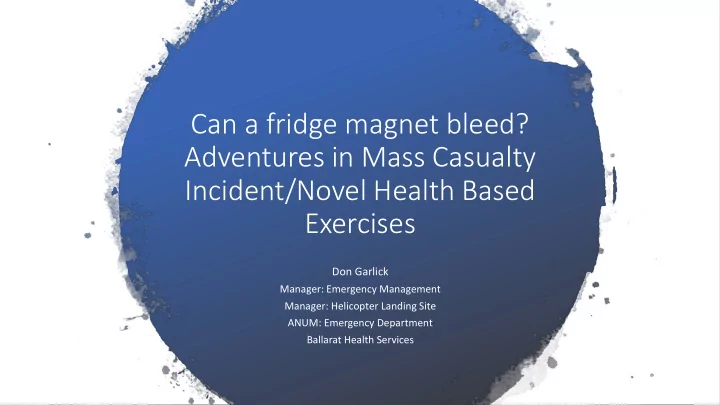

Can a fridge magnet bleed? Adventures in Mass Casualty Incident/Novel Health Based Exercises Don Garlick Manager: Emergency Management Manager: Helicopter Landing Site ANUM: Emergency Department Ballarat Health Services
Objectives • Note different types of exercise modalities • Demonstrate using ‘routine’ fire training to incorporate low frequency-high consequence events • Explore the challenges and successes of delivering mass casualty incident exercises • Discuss how to develop and use Performance Indicators • Examine some unique opportunities for training
Emergency Management Drills and Exercises • Traditional fire drills • Harmonising critical Australian Standards, AIIMS & MCI management • Command & Control • Communication • Human behaviour in emergencies
Mass Casualty Exercises • Tactical exercise with ‘troops’ • Tactical exercise without ‘troops’ • Desk top exercise • Discussion exercise • Combination
EmergoTrain System • Internationally recognized disaster simulation tool • Used as an educational tool for training and testing preparedness for disasters • Uses magnetic symbols to represent patients, staff and resources; movable markers indicating priority and treatment; and a large patient bank with various injuries • A protocol has been developed to identify time taken for various clinical interventions and likely outcome • Real time management of the incident is a major focus of the system
BHS Code Brown Exercises • 2006: Exercise ‘Nugget’ • Two carriage train derailment • 10 deaths, over 150 casualties • 2008: Exercise Glass House • RTA involving an Explosive Transport Vehicle resulting in an explosion • 24 deaths, over 150 casualties • 2010: Exercise Slippery Slope • Train derailment & rollover • Over 180 casualties, 150 sent to ED • 2012: Exercise Gumdrop • School bus vs train • 19 deaths, 140 patients • 2015: Exercise Run4UrLife ‘Checkerboard’ • Two explosive devices at the annual local fun run • 18 deceased, 128 casualties • 2018: Exercise Charger • Vehicle borne attack and shotting at a local university • 30 deaths, over 100 patients
MCI Exercise Performance Indicators
PI Results 2008-2018 Performance Indicators: Raw Numbers 50 45 40 35 30 25 20 15 10 5 0 2008 2010 2012 2015 2018 Achieved Partially Achieved Not Achieved
PI Results 2008-2018 Performance Indicators: Percentages 100 90 80 70 60 50 40 30 20 10 0 2008 2010 2012 2015 2018 Achieved Partially Achieved Not Achieved
Triage & Registration 2018 Results 2015 Results 2012 Results 2010 Results 2008 Results Performance Indicator ACHIEVED? All Triage staff wore appropriate tabards All casualties (Gubas) entering BHS were triaged using the ATS system All casualties (Gubas) entering BHS were captured electronically Triage used a casualty distribution plan that was developed within 60 minutes Triage staff communicate regularly to the ED MTL &/or NTL
Emergency 2018 Results 2015 Results 2012 Results 2010 Results 2008 Results Performance Indicator ACHIEVED? Department ED staff identified that a MCI has occurred within 10 minutes of the arrival of the first self-presenting casualty ED staff notified the BHS Patient Flow Coordinator within 5 minutes of the recognition that a MCI has occurred All ED staff wore appropriate tabards ED staff recognized the need for an Alternate ED & dispatch a senior ED Medical & Nursing staff member to the appropriate area within 60 minutes ED Medical staff were distributed as per Code Brown Plan (that is medical staff are assigned specific work areas) within 60 minutes A casualty distribution plan was developed (by ED MTL & NTL) within 60 minutes ED MTL &/or NTL communicated regularly to the HIMT
Alternate ED (PDU) 2018 Results 2015 Results 2012 Results 2010 Results 2008 Results Performance Indicator ACHIEVED? PDPU & Alt ED staff wore appropriate tabards PDPU TL & ED nurse determined who would be Alt ED NTL within 5 minutes of ED nurses arrival Alt ED established within 30 minutes of Alt ED MTL arrival Alt ED staff were distributed as per Code Brown Plan within 60 minutes Alt ED MTL &/or NTL utilized the electronic ED patient management system to manage workload & update casualty information Alt ED MTL &/or NTL filled in situation reports prior to Operational Briefings
Other Agencies • Emergency Services • FEMOP • VMAT • Private Hospitals • Municipal • Regional EMT • Defence
Critical Mortality Rate (Make them bleed) • The number, as a percentage, of all critically injured survivors who die in a mass casualty incident (Frykberg, 2002) • Preventable deaths • CMR as an additional PI can be used to demonstrate the effectiveness of (1) MCI plans & (2) individual clinical care • Needs to carefully planned & monitored • In 2012 exercise BHS had a CMR of 15% (3/20)
CBR Exercises • Focus on key skills • Donning PPE • Appropriate triage • Command & control • Simple decontamination
VMAT Exercises
Summary
Recommend
More recommend